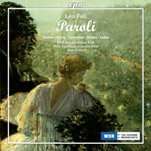|
Back
08/03/2015
Leo Fall: Paroli (Frau Denise)
Anke Krabbe (Denise), Andrea Bönig (Marquise of Gailladière), Jörg Dürmüller (Jean), Michael Roider (Josef Drechsler), Ralf Lukas (Marquis of Galladière), Henning Freiberg (Narrator), West German Radio Chorus, Cologne, Robert Blank (Choral Director), WDR Radio Studio Orchestra of Cologne, Axel Kober
Recording: Philharmonie, Cologne, Germany (March 12-24, 2012) – 51’ 54
cpo # 777 899-2 (Distributed by Naxos of America) – Booklet in German and English

   
Moritz Fall’s home never lacked a tune or a joke. His family, including son, Leo, was endlessly caught up inside a whirl of laughter and merriment. This joie de vivre would indelibly leave a heightened impression of happiness inside Leo Fall’s works. Alongside Franz Lehár and Oscar Straus, Leo Fall’s contributions greatly added to the iridescence of Vienna’s ‘Silver Era’ operettas.
Originally, Paroli didn’t even qualify as a bona fide operetta. Neither fish nor fowl, Paroli (originally titled Frau Denise), was actually a singspiel in one act, consisting of a seven member ensemble. Clocking in at under one hour, this catalogued ‘chamber work’ wound its way on to the stage in 1902 between two other one-act compositions, Courteline’s Ein Selbstmörder gesucht and Verber’s Der Herr Commissär. Lost in the middle was Paroli’s demise, a premiere described as ineffective. Time, however, was kind to the work. By 1903 Frau Denise was retitled to its current name and reclassified as a “comic opera.”
The Paroli plot deals with a variant Beaumarchais Figaro theme. Fall unmistakably framed the front and back of the score with use of stately horns, a distant recollection to von Flotow’s Martha, (1847.) This majestic approach ushers in Robert Blank’s West German Radio Chorus with bouncy flights of galloping zestfulness while anticipating Fall’s later successful work, Madame Pompadour (Read here) in 1922. Anglican nuances of Sullivan’s farcical comedies creep inside the score as well.
Fall leans heavily on a Mozart formulation by use of a pithy ‘reconciliation’ quartet and back up chorus. This journey is pleasantly engaging though it tends to get a bit ‘Wagnerian’ in the conclusive bars leading back to the horn theme. Paroli insides provide ample opportunity to unveil the many vocal strengths of Anke Krabbe, Andrea Böning, Jörg Dürmüller, Michael Roider and Ralf Lukas...their acting is exceptional too. Likewise, conducting is rendered superbly by Axel Kober, allowing the score to breathe with unparalleled vibrancy.
Seven musical selections geometrically alternate with the pockets of precise narration by Henning Freiberg. Since an entire story must unfold, develop and resolve itself in a short period of time, critical importance is placed upon cast members giving Paroli their full attention. With dialogue being exceedingly convincing while driving Paroli forward, accomplishments are achieved on all levels. Sound effects are excellent in elevating the dimensional absurdity.
Paroli’s evolution is elaborated in the liner notes though more attention could have been invested in track description and a better delineated synopsis since no libretto is provided. Michael Roider’s photograph credit (it reads Anke Krabbe) is a blatant faux pas. Aside, cpo well represents the beginning of Fall’s imminent successes.
Christie Grimstad
|